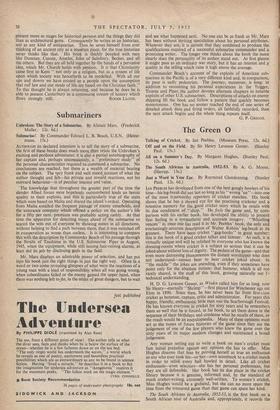Submariners
ALTHOUGH its declared intention is to tell the story of a submarine, the first of these books does much more than relate the Unbroken's exciting and perilous adventures: it is also a partial autobiography of her captain and, perhaps unconsciously, a "preliminary study" of the personal characteristics required to command a submarine. No conclusions are reached, but there is a wealth of material bearing on the subject. The wry frank and well stated account of what the author thought and felt—his private and inward reactions, not his outward behaviour—is of peculiar interest and value.
The knowledge that throughout the greater part of the time the slender Allied forces were hopelessly outnumbered lends an heroic quality to their exploits, and this is particularly true of the units which were based on Malta and shared the island's ordeal. Operating from Malta entailed the frequent passage of enemy minefields, and the assurance company which offered a policy on the author's life for a fifty per cent. premium was probably acting rashly. At that time the apparatus for detecting mines ahead of the submarine so scared the wits out of everyone by showing mines in all directions, without helping to find a path between them, that it was switched off in exasperation as, worse than useless. It is interesting to compare this with the description by Commander Beach of his passage through the Straits of Tsushima in the U.S. Submarine Piper in August, 1945, when the equipment, while still issuing hair-raising- alarms, at least did its job by disclosing gaps in the field.
Mr. Mars displays an admirable power of selection, and has put into his book just the right things in just the right way. Often in a word or two come revealing glimpses of what were the reactions of a young man with a load of responsibility when all was going wrong, when subordinates failed or the enemy gained the upper hand, when there was nothing left to do, in the midst of great dangers, but to wait and see what happened next. No one can be as frank as Mr. Mars has been without inviting speculation about his personal attributes. Whatever they are, it is certain that they combined to produce the qualifications required of a successful submarine commander and a promising writer. The longer one thinks about the book the more clearly does the personality of its author stand out. At first glance it might pass as an ordinary war story, but it has an interest and ,a quality in the telling which raise it high above the average.
Commander Beach's account of the exploits of American sub- marines in the Pacific is of a very different kind and, in comparison, its pace is sadly pedestrian. The journey, moreover, is long: in addition to recounting his personal experiences in the Trigger, Tirante and Piper, the author devotes alternate chapters to notable exploits of other U.S. submarines. Descriptions of attacks on enemy shipping fill the book and follow a pattern that quickly becomes monotonous. One has no sooner reached the end of one series of detailed attack data and firing orders, all faithfully recorded, than the next attack begins and the whole thing repeats itself.
G. P. GRIGGS.


























































 Previous page
Previous page